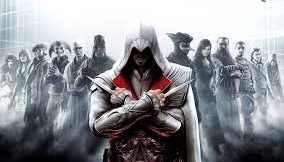The Role of Stories in Video Games
As video games grow more dynamic in terms of graphics, online functions, and console capabilities, the types of games available are also becoming more diverse. Sports aficionados have a boundless choice of sports games, and fantasy lovers can explore new worlds and interact with fictional creatures. Some games are a blend of skill and button-mashing, and others involve the player in intricate storylines. These storylines have also become more developed, adding a degree of depth and texture to the gaming experience. The importance of a good plot, whether it is laid down on paper or in a digitized format, remains constant. As children seem to read less and play video games more, is it probable that video games will replace short stories and novels as the vessels of stories? Will the day come when the plots and characters of video games and novels are of the same caliber?
It is unlikely that this will be the case. Nothing can replace the feeling of a book between your hands or the hours of enjoyment found in words arranged to convey meaning and feeling. It would be difficult to capture the torment felt by Sheriff Ed Tom Bell from Cormac McCarthy’s No Country for Old Men in a video game because we are able to see his most inner and secret thoughts. Comparing video games to novels might be like comparing apples to cabbage,but this doesn’t mean that the stories in video games can’t be as engaging as the stories told in novels and short stories: both novels and video games allow a person to interact with characters and explore new and exciting worlds. While video games might never be comparable to novels, they share many of the same features, such as plot and character development.
Plot vs. Story
First, we should distinguish between the terms “plot” and “story,” as these words are often used interchangeably. “Plot” usually refers to what happens (first this happened, then this happened). Plot tracks the physical movement of characters: what they are doing, where they are going, etc. There is also an element of causality to plot: event A led to event B and B led to C, and so on. A “story” on the other hand, is the idea that is arranged by plot. It is what gives plot depth and reaches us on an emotional level. Stories can also serve a didactic function. By rearranging or altering plot, the same story (boy meets girl, good versus evil, etc.) can be retold many different ways. But the larger question is, when do video games cease to have plot and have a story? And if they do tell a story, are these stories any good?
Let’s take the Assassin’s Creed games as our first example. The plot of these games hinges on the Templar-Assassin feud, as well as Desmond’s attempts to thwart the Abstergo corporation and save the planet from a solar flare. The “good versus evil” story is compounded with the “freedom versus order” argument, which textures the story that unravels throughout the game.
In the first Assassin’s Creed game, one of the targets of the assassin Altair is Garnier de Naplouse, a doctor who has been performing cruel experiments on his patients. However, when Altair infiltrates the fortress where Garnier works, he hears a patient thanking the doctor for helping him. When Altair speaks to Garnier as he is dying, the doctor claims to have freed the patients “from the prisons of their minds,” suggesting that if everyone is free to do or think as he or she pleases, then the individual will be overwhelmed.

Similarly, in Assassin’s Creed III, while they have temporarily allied with each other, assassin Connor and Templar Haytham discuss what the Templars truly want. Haytham explains that the Assassin’s goal of freedom is “an invitation for chaos;” the Templars want order and stability, a far more sensible and realistic goal in Haytham’s eyes. Though the player wants the Assassins to be successful in the end, the Templars make a fairly compelling argument that at least allows the player to think about the Templar point of view. The story told in the Assassin’s Creed games is complex and dynamic and is a generally good story.
Another example of games with plot and story are the Kingdom Hearts games. In the first game, the story is as much about good versus evil as it is about friendship, growth, and destiny. Sora and his friends must fight the darkness within them, embodied by the Heartless, as well as the antagonists who would plunge every world into darkness. While the fight against the Heartless and Ansem provides the major source of conflict, Sora’s quest to find his friends and keep them safe also drives the game. His willingness to sacrifice himself to give Kairi her heart back shows how important his friends are to him. In terms of growth and destiny, Sora embraces his role as a key blade master. During the Dive to the Heart at the beginning of the game, the mysterious voice tells Sora that he has no need to be afraid of the darkness, as he is the one who will open the door, Kingdom Hearts. Indeed, Sora tells Ansem that behind Kingdom Hearts is light and not darkness, as Ansem believes. It is not a coincidence that the world Sora is from is called Destiny Islands. The list of examples could go on, but Kingdom Hearts shows that it is possible for video games to deal with themes that are found in novels, such as friendship, growth, and destiny.

Of course, not all games tell complex stories. Some games are based more on plot, sequences of events, rather than overarching ideas. The Soul Calibur games in the Soul series is an example of this (the exception is perhaps Soul Calibur V, which has a story mode that tried to go beyond the arcade-like story mode of other games). While there is an overarching story of “good versus evil,” Soul Calibur versus Soul Edge, the games seem more like a series of events with a loose veil of a story wrapped over it. This is not meant to be disparaging or critical of the game, but the games are not designed around a strong story like Kingdom Hearts or Assassin’s Creed. The fighting game style and arcade design attests to that.

The tag-line of the Soul Calibur games is “A tale of swords and souls, eternally retold.” Therefore, each game is like a reincarnation of the previous game; it is hard to tell what is canon and what is not. Of course, each character has his or her own story that comes to light throughout each game. In Soul Calibur III, the player can make choices of where to go or what to do before and after each round. Additionally, the Soul Calibur games (with the exception of Soul Calibur V) have unique character endings. But despite the character endings and variations that exist between the games, the overall story is better defined as a strong plot than a story.
There are also games like The Walking Dead where the player’s choices have direct consequences to the narrative. The player may have a limited amount of time to make a decision. Sometimes the player will have to decide who lives and who dies, affecting the way non-playable characters react to the playable character. The Walking Dead involves the player in the story in a new way, offering him or her more control over the story and the ability to make the story feel unique and organic.
Character Development
There is more to a story than just plot: there are characters. Stories need characters for readers or players to latch onto and to like or hate. We can judge the characters in video games just like characters in a book. We can hope that characters learn or reach a realization about themselves or about the world in which they live. Maybe they even grow from their experiences (though they don’t always). In Stephen King’s ‘Salem’s Lot, Ben Mears and Mark Petrie must come to terms with the existence of vampires in their town and have to make difficult decisions regarding their loved ones. We share their terror, anger, and resolve as we read. Also in video games, players often view the virtual world through the eyes of a certain character(s). We want our characters to have some degree of depth, something that has us rooting for them. But do we care about our video game characters like we do characters from novels? Do we care as much about Sora from Kingdom Hearts as we do Oliver from Oliver Twist? It’s possible that we do, but the preferences of the player or reader ultimately determines whether or not he/she cares about a character. However, we can assess if video game characters are just as “round” or “flat” as literary characters.
All characters, “round” or “flat,” should make an impression. Even “flat” characters serve a purpose. By definition, there is not much depth to “flat” characters, but their surface must still give the reader a sense of who they are and how they populate their world. In the realm of video games, an example of a “flat” character would be Revenant from Soul Calibur III (he also appears in Soul Calibur IV in Zasalamel’s story mode). In the game, Revenant is given little to no backstory. He does not talk, as he makes grunts and growling noises as he fights, and he has a skull for a head. Nevertheless, his appearance is enough to signal the player that Revenant is a sinister character. Additionally, in the first Kingdom Hearts game, there are people who populate Traverse Town. The player can speak to them, and it is revealed that these people have lost their homes to the Heartless and sought refuge in Traverse Town. These characters are not give names and not much is known about them, but their presence in the town illustrates the destructive nature of the Heartless.

“Round” characters, on the other hand, include the Assassin’s Creed protagonists, Ezio and Connor, as well as antagonist Haytham. Each of these characters have a distinct personality. Throughout the games in which Ezio is featured (Assassin’s Creed II, Assassin’s Creed Brotherhood, and Assassin’s Creed Revelations), we see him grow from a young adult eager to avenge the death of his family to a wise leader who has built up the Assassin brotherhood to formidably challenge the Templars. However, Ezio’s charm and humor remains a staple of his personality, even if it is tempered by age.
Connor, from Assassin’s Creed III, is a rather serious young man who fluctuates from being wise for his age and being naïve and impulsive. His half-Native American and half-British heritage causes him angst about his identity and his place in the world. He also has a strong sense of justice and right and wrong, but also has a tumultuous relationship with his father Haytham. Haytham is intelligent and charming but also violent and unrepentant. He admits that he spared Connor’s life merely out of curiosity and as he dies (by Connor’s hand), Haytham says that he should have killed Connor when he had a chance. We get a good sense of these characters, knowing a little bit about their motivations and personality. They have depth to them, they experience emotional growth, and players are able to live the story through them.
Different Types of Video Games

While we expect novels to have “round” and “flat” characters, as well as engaging plots that structure strong, vibrant stories, video games come in a wide assortment, having minimal plot to full-fledged stories to everything between and beyond. Not all video games even tell a story, and some don’t have any “round” characters at all, which is why it seems unlikely that video games will ever be on par with novels and short stories. However, this is part of the charm and allure of video games. Games like Madden NFL and NBA Live tell no story. The Mario Kart games also do not have a story, and these games don’t need to. The characters in these types of games might be based on real people like athletes or be fun, fictional characters like Mario, Yoshi, and Donkey Kong. They do not need to be “round,” deep, intellectually stimulating characters in order for the player to enjoy them.

There are also games that are based on outside sources, such as movies. For instance, some James Bond games are based on the plots of the movie of the same title. Other Bond games, like Agent Under Fire or Nightfire, are not based on any movie but follow the same formula as the other games based on movies. The characters, while fun to battle or use, are not “round.” Even Bond never seems to experience any type of growth, but the player does not necessarily expect him to. The games can still be fun and exciting nonetheless.
Player Preference
Should we even expect video games to have a well-developed plot/story and characters with depth? The answer: it depends. Not everyone wants to play a game that tells a story. In addition to having a wide variety of games to choose from, people might play games for certain features, such as online and multiplayer capabilities. Some people might play the Call of Duty games for the zombies. The Mario Party games are fun to play with a group of your friends: there is no story being told. Soul Calibur III, Soul Calibur IV, and Soul Calibur V have a character creation mode that certainly appeals to other gamers. Even if a story mode is present, the story may not matter to the player. Sports games like Madden NFL and NBA Live do not need an intricate plot or to tell a story to be successful because the players of these games do not expect these games to have a story.
Conclusions
We live in a world where smart phones and apps are taking over, and video games are important to many people, for better or for worse. They are used as a form of relaxation or as a group activity, and with the advent of online gaming, we can connect not just with friends but with people all around the world. Perhaps video games are not important to all people in the same way that books are, but we cannot deny that the world is becoming increasingly digitized. And maybe we cannot compare the plots of video games to the plots of novels equally, but it is possible that video games can be used to tell a good story. Good books are the ones you don’t want to put down; you want to know what happens next. Video games with the strong plots and storylines evoke a similar reaction from players: you end up playing for hours because you want to know what comes next.
There will always be people who look down on video games as a lesser form of entertainment, but video games are a part of people’s lives. Some of us can remember the first video game we played, just as we remember the first book we read. Stories can be told orally, in print, in film, or through graphics. Though they might not seem equally able to tell a good story, perhaps it is only a matter of time before video games change the way we think about how stories are told.
Works Cited
Alcorn, Steve. “Tips for Writing a Novel: Know the Difference between Plot and Story.” Udemy.com. n.p., 6 Mar. 2013. Web. 13 Jun. 2014.
Wood, James. How Fiction Works. New York: Picador, 2008. Print.
What do you think? Leave a comment.











It can be a bit strange at times. I can play sports games like FIFA and Football Manager or strategy/simulations like Civilization for hours but couldn’t get into Skyrim for example because of the lack of story. In fact have enjoyed all the recent Bioware games even the ones criticised for being a bit weak (Dragon Age 2, Mass Effect 3) because the story was at least enjoyable.
I suppose I can to an extent ignore the story aspect for certain genres but once it comes to an RPG but even action and FPS games, a decent story becomes a must
There IS a story in Skyrim but, (and this is one of the things that I like about the game) you’re completely free to ignore it and go off and do your own thing… which I usually do.
So, when Skyrim gets taken over by dragons, because the Dragonborn is off mucking around in the countryside, capturing mudcrab’s souls and enchanting iron daggers with them, it’s all my fault.
I reckon one of the reasons I preferred Fallout to Skyrim is that in Fallout sometimes nobody particularly seemed too bothered about the player character.
In a lot of RPGs, when the player character turns up somewhere, everyone in the town is falling over themselves to ask them to do something. Some little mini quest for the hero that they couldn’t do themselves, or some action to push some part of the narrative onwards. Fallout, on the other hand, had these self contained little communities that seemed to be going about their own buisness regardless of the player character, and when you turned up you could be greated by a reasuringly ungamey “Anyway, who the heck are you?”
I think strengthening the narrative in games is barking up the wrong tree. For me the best games are the ones with a high degree of emergent gameplay, such as XCOM, Civilization, GTA and Skyrim. Games that set up a world or a set of rules and allow non-scripted story-like elements to occur.
Who can forget that time I was escaping in a stolen ambulance, then hit a post and went flying through the windscreen into the sea? Or that time Zhang was bleeding out, so “Nuts” Vega dodged plasma bolts from several enemies in order to rescue him?
What I’m saying is, the emergent stories that happen only to you are generally far more memorable than the ones that the writers have scripted for you.
Barking up the wrong tree? I would suggest that what we actually want is a forest of trees. There is room in gaming for all manner of genres and approaches, both emergent and narrative based. Interactivity offers so many ways of approaching storytelling, so many ways to involve and invest the player in events and characters that you can’t get from books or film. Equally, it offers the possibility of creating worlds in which emergent situations can arise.
Both approaches have often been disregarded in the past in favour of straightforward gameplay mechanics or graphics improvements, but there is scope for everything to be looked at an improved. It all has a place; particular genres or games will benefit from varied approaches and styles.
Story is a tool used to hide a weak game usually. A game should be a game… have gameplay and challenge the dexterity of a player.
My favourite example of this sort of thing is Enslaved. Loved the story so I played it to the end. Hated the game though, as it was so basic. That game really needed a “skip game” button so I could move on to the next cut-scene.
Narrative can be done well, like Last of Us, but more often than not its cheese like Uncharted.
Oh totally, The Last of Us was one of the finest pieces of Story telling I’ve ever had the fortune to witness, it also helped he did EXACTLY what I would have done at the end.
Another series where one can make his character and choose what type of character the protagonist is, is Mass Effect. Your actions dictate the outcome and somewhat influence later events and you can give Commander Shppeard a look, a personality, and everything. It’s incredible that way and also has a great story, a deep plot and great graphics.
I really like the point you’re trying to make. To me, books will always be No. 1 in stories but I also acknowledge that people will increasingly disagree with me as time goes on. Great article.
It’s funny that while most “classic” gamers enjoy games with little story and an emphasis on gameplay, I personally enjoy a game that is story heavy. Now, sometimes it can get pretty ridiculous (I think of Metal Gear Solid and it’s 90 minute cutscenes), but in the end, the best part of a game for me is the story. Moreover, though I prefer film as a storytelling artistic medium, it ought to be said that video games are the only art form that allow for interactivity in it’s story. No other medium allows that, so, why not take full advantage of the ability to have people to partake in a unique experience.
Make the game itself good and I am happy.
I thought this article was really good. I believe story is important in most games and it is good when you get to watch the characters grow and change with the story. When I think f stories with good narrative, The Walking Dead by Telltale and the campaigns of some games like Splinter Cell and Watch Dogs are what springs to mind.
I love a good story in my game, but JRPGS have been what I grew up on. From Chrono Trigger to Final Fantasy, I always felt like a video game with a good story gave me an opportunity to engage on an entirely different level. Great article!
Great article! I’m honestly not very familiar with video games – it’s something I’ve been trying to get into more as of late. Your article is wonderful and gives me a lot to think about!
A game I remember being instantly drawn into was Remedy’s ‘Alan Wake’, maybe because it was structured like a book, or rather written literally as a book. Stories in games have not reached their highest peak yet, and games are so much better, in my opinion, with a engrossing story and characters who are easy to relate to. I am beginning to be bored by repetitive game mechanics and I am unlikely to pick a game up nowadays if it does not have a good story.
Anyways, love this article and the ideas raised within it!
Your discussion of the difference between plot and story was really interesting and enjoyable to read. The whole article, in fact, was a lot of fun. Thanks for picking such a cool topic~
I like something very linear like Limbo or Portal, or more of the interesting not-really-a-game-is-it genre that has spawned Gone Home and The Stanley Parable.
I don’t play games nearly as much as I used to but, for me, The Last of Us felt like a giant leap forwards in terms of marrying strong narrative and great gameplay.
Thank you for your overview of some of the games available. I really liked the section on Soul Calibur, the story behind this game regarding reincarnation interests me. I like the opportunity of making choices and seeing how they play out in the end. Kind of a way to see life in a different way, if I did this than that would happen. Though there are far more uncontrollable elements we have to contend with in life, but the game is an escape for awhile. Yes it can be seen as a way to shut out the world but it does give us the opportunity to connect with the world through online games
The only stories I can remember in any detail are Final Fantasy 7 (and the massive gut punch about half way through), Bioshock and a game from years back called Anachronox.
Most stories in games are shockingly bad and best ignored.
I don’t think that any game has ever hit the heights of immersion of playing Half Life for the first time when the soldiers actually took cover and tried to flank me…
I loved the story line from the Modern Warfare games purely because I thought Captain Price and Soap Mctavish were superb characters, yes the storyline was a load of old bollocks but Price was a legend.
For my money, the Last of Us proves that video gaming can be considered an art form, mainly from the force of its storytelling.
Storytelling is important, but I think people often forget what the video game medium is all about: experiencing something that we couldn’t otherwise. I don’t think that storytelling needs to play a role in that necessarily.
I don’t think all games need a story. It can certainly makes a game more enjoyable, especially single-player. But as the article said, most multi-player games don’t need a story. Many casual games don’t have stories and if they do it’s minimal.
Games should mostly be about having fun. It doesn’t have to be some deep philosophical piece. Some people enjoy playing games like that, but others not so much. It really depends on the audience.
I enjoyed your inquiry to whether games and novels are comparable by comparing their attributes. Games and writings are not comparable enough to do so. They do share these common threads but they are so different. The game is still such an illusive genre to define that we have sub categories and sub sub categories and so on, just as writing does.
I think games shouldn’t be compared to stories as much as they should to writing in general. You can try to compare a textbook to video games. Compare and contrast learning objectives in some educational games, but then say that zombies are not educational so games aren’t as good as books. Though then you shed light on the fact that the genres aren’t intertwined and therefore should be left to develop, because who knows, one day games could very well be studied as an artform like novels. I see it happening in the next 15 years.
When I choose a game, the first thing I look for is whether or not I can see myself getting involved with the characters. If I don’t care about my comrades or the guy I’m supposed to defeat, what’s there to motivate me to see this thing through to the end?
You hit some pretty good points, but you seem to be beating around the bush. Why not try narrowing your topic next time or be a little more specific with the content of these games?
Great article. I definitely think it’s intriguing to see how games as a medium capture stories, and how the level of immersion and interactivity helps. I found your point about whether novels like something McCarthy writes can transfer to gaming to be fascinating. There are a lot of games like SOMA that capture themes discussed in written fiction spectacularly.
Some storytelling elements work in one medium, but don’t work in another. For example, in A Song of Ice and Fire, it came as a surprise when seemingly new characters turned out to be old characters because readers couldn’t see what the characters looked like since they were reading a book. Those kinds of twists wouldn’t work in Game of Thrones since we see everything that’s happening on screen. Now, when it comes to video games, the kind of story the developers want to tell needs to compliment the gameplay. It doesn’t work when you’re trying to tell a serious murder mystery when the game is an action platformer. However, I’d like to think most game developers are smart and experienced enough to know how to tell a good game narrative.
Mario Kart has an implied backstory with all of the playable characters. Rather interesting the more you are creative with the thinking here.